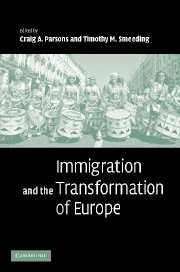Book contents
- Frontmatter
- Contents
- List of figures
- List of tables
- List of contributors
- Acknowledgements
- 1 What's unique about immigration in Europe?
- 2 Europe's immigration challenge in demographic perspective
- 3 Migration into OECD countries 1990–2000
- 4 Divergent patterns in immigrant earnings across European destinations
- 5 Economic consequences of immigration in Europe
- 6 Occupational status of immigrants in cross-national perspective: A multilevel analysis of seventeen Western societies
- 7 Immigrants, unemployment, and Europe's varying welfare regimes
- 8 How different are immigrants? A cross-country and cross-survey analysis of educational achievement
- 9 Immigration, education, and the Turkish second generation in five European nations: A comparative study
- 10 Managing transnational Islam: Muslims and the state in Western Europe
- 11 Migration mobility in European diasporic space
- 12 The new migratory Europe: Towards a proactive immigration policy?
- 13 European immigration in the people's court
- 14 The politics of immigration in France, Britain, and the United States: A transatlantic comparison
- 15 “Useful” Gastarbeiter, burdensome asylum seekers, and the second wave of welfare retrenchment: Exploring the nexus between migration and the welfare state
- 16 The European Union dimension: Supranational integration, free movement of persons, and immigration politics
- 17 The effectiveness of governments’ attempts to control unwanted migration
- Index
- References
15 - “Useful” Gastarbeiter, burdensome asylum seekers, and the second wave of welfare retrenchment: Exploring the nexus between migration and the welfare state
Published online by Cambridge University Press: 23 June 2009
- Frontmatter
- Contents
- List of figures
- List of tables
- List of contributors
- Acknowledgements
- 1 What's unique about immigration in Europe?
- 2 Europe's immigration challenge in demographic perspective
- 3 Migration into OECD countries 1990–2000
- 4 Divergent patterns in immigrant earnings across European destinations
- 5 Economic consequences of immigration in Europe
- 6 Occupational status of immigrants in cross-national perspective: A multilevel analysis of seventeen Western societies
- 7 Immigrants, unemployment, and Europe's varying welfare regimes
- 8 How different are immigrants? A cross-country and cross-survey analysis of educational achievement
- 9 Immigration, education, and the Turkish second generation in five European nations: A comparative study
- 10 Managing transnational Islam: Muslims and the state in Western Europe
- 11 Migration mobility in European diasporic space
- 12 The new migratory Europe: Towards a proactive immigration policy?
- 13 European immigration in the people's court
- 14 The politics of immigration in France, Britain, and the United States: A transatlantic comparison
- 15 “Useful” Gastarbeiter, burdensome asylum seekers, and the second wave of welfare retrenchment: Exploring the nexus between migration and the welfare state
- 16 The European Union dimension: Supranational integration, free movement of persons, and immigration politics
- 17 The effectiveness of governments’ attempts to control unwanted migration
- Index
- References
Summary
Introduction: Managing migration, managing welfare
Migration has re-emerged as a highly politicized, divisive, and contested issue in European politics over the past twenty-five years or so. Much of the public debate has focused on the economic ramifications of migration and a commonly rehearsed claim underlying calls for restrictive policy concerns: the “drain” on welfare systems that migrants constitute. The phenomenon of “welfare state chauvinism” is by no means unique to its Scandinavian origins, and throughout Europe populist xenophobes portray migrants as welfare scroungers. More sophisticated opponents of liberal migration point to the difficulties in labor market integration experienced by the second and third generation of Europe's ethnic minorities. Meanwhile, pragmatic policy-makers regard migration as one possible tool in redressing Europe's demographic deficit, the shifting age pyramid and the looming pension shortfalls. Despite the burgeoning literature on migration to Europe (Guiraudon and Joppke 2001; Geddes 2003; Lahav 2004), few scholarly efforts link discussions of the future of European welfare systems with immigration (for an exception see Bommes and Geddes 2000).
This chapter addresses this gap in the literature by focusing on the following key question: how do the four main types of European welfare state regimes – liberal, Bismarckian, Scandinavian, Mediterranean – interact and cope with migration? In pursuing this line of inquiry and focusing on the mechanisms of inclusion (or lack thereof) by various welfare regimes in Europe, I explore both how migration affects these various welfare regimes and conversely how they affect migrants.
- Type
- Chapter
- Information
- Immigration and the Transformation of Europe , pp. 393 - 418Publisher: Cambridge University PressPrint publication year: 2006
References
- 6
- Cited by



